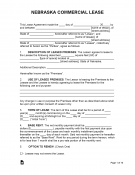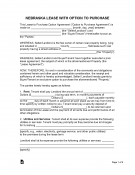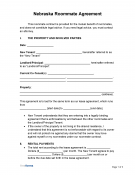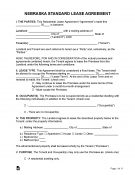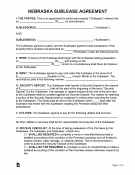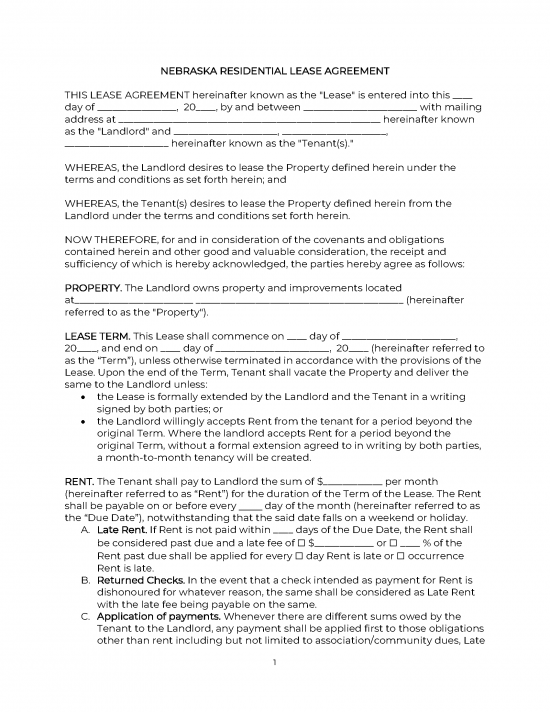Nebraska lease agreements are contracts that govern tenancies in the state. Lease agreements are written, signed by both landlords and tenants, and contain key terms of a lease, such as the monthly rent and which party will be responsible for certain utilities. The lease agreement may be thought of as the first resource for both landlords and tenants in defining their rights and obligations under the lease.
Contents
By Type (6)
- Commercial Lease Agreement
- Rent-to-Own Lease Agreement
- Month-to-Month Lease Agreement
- Roommate Lease Agreement
- Standard Lease Agreement
- Sublease Agreement
Download: Adobe PDF, MS Word, Rich Text Format
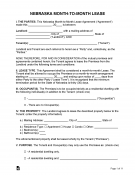 Month-to-Month Lease Agreement
Month-to-Month Lease Agreement
Download: Adobe PDF, MS Word, Rich Text Format
Download: Adobe PDF, MS Word, Rich Text Format
Download: Adobe PDF, MS Word, Rich Text Format
Download: Adobe PDF, MS Word, Rich Text Format
Download: Adobe PDF, MS Word, Rich Text Format
Landlord-Tenant Laws
Statutes – Chapter 76, Article 14 (Uniform Residential Landlord Tenant Act)
Required Disclosures (2)
Identity – Landlords must disclose in the lease agreement the names and contact information for anyone who will be allowed to come on to the property, as well as provide an official address for notices and complaints from tenants. (§ 76-1417)
Lead-Based Paint Disclosure – Under federal law, landlords must include an explanation of the dangers of lead-based paints in a lease agreement when leasing a property with a dwelling unit built before 1978.
Security Deposit Laws
Maximum Amount ($)
Landlords may not require a security deposit in excess of one (1) month’s rent, unless the tenant will be living with a pet, in which case the landlord may demand an additional twenty-five percent (25%) of the monthly rent. (§ 76-1416)
Returning to Tenant
Upon termination of a lease agreement, the landlord may retain a portion of the security deposit to account for owed rent, or damage to the property that resulted from the tenant’s failure to comply with the rental agreement. The remainder, along with a written itemization of any deductions, must be mailed to the tenant within fourteen (14) days of the termination of the tenancy. If the tenant has not provided a new address to the landlord, the itemization and funds should be sent to the tenant’s last known address. If this fails to reach the tenant, the landlord must, within one (1) year of attempting to reach the tenant, provide the funds to the State Treasurer, as the deposit would be categorized as “abandoned property” at that point. (§ 76-1416)
When is Rent Due? (grace period)
Because Nebraska law does not name a rent due date or require a grace period, rent is due at the date and time specified in the lease agreement.
Eviction Notice (non-payment)
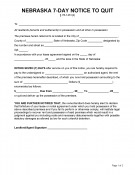 7-Day Notice to Pay or Quit – If a tenant fails to pay rent on the date it is due, and the landlord or an agent delivers a notice informing the tenant of the landlord’s right to terminate the lease agreement if rent is not paid in full within seven (7) days, then the landlord may terminate the lease agreement seven (7) days after delivering the notice. The landlord or agent must include a notice of service like the one that is included here. (§ 76-1431(2))
7-Day Notice to Pay or Quit – If a tenant fails to pay rent on the date it is due, and the landlord or an agent delivers a notice informing the tenant of the landlord’s right to terminate the lease agreement if rent is not paid in full within seven (7) days, then the landlord may terminate the lease agreement seven (7) days after delivering the notice. The landlord or agent must include a notice of service like the one that is included here. (§ 76-1431(2))
Download: Adobe PDF
Maximum Fees ($)
Late Rent Penalties
Landlords are permitted to charge late fees for providing late rent, but the fee must be clearly identified in the rental agreement and must be reasonable. (§76-1414)
NSF Checks
Nebraska law does not specify a fee that may be charged for providing a rent check with insufficient funds, but does allow landlords to collect such a fee as long as the fee is clearly identified in the rental agreement, and is reasonably related to the costs incurred by the landlord in receiving a bounced check.
Tenant’s Unclaimed Property
If, after the termination of a tenancy, the landlord finds personal property that appears to belong to the former tenant, the landlord must collect and store the property, and make arrangements to provide a reasonable opportunity for the tenant to reclaim it. The landlord must, within six (6) months of the termination of the lease, provide the former tenant with written notice, including a description of the property. The landlord need not describe everything encountered, but has a duty of reasonable care toward all non-perishable personal property found, and may not escape liability for failure to care for property merely by not listing it. The notice should make clear to the tenant: (i) the place where the property is being kept and the manner in which it may be retrieved; (ii) that the tenant may be required to reimburse the landlord for the reasonable cost of storing the property; (iii) that the property may be destroyed if not reclaimed within two (2) weeks of the date the letter was posted or seven (7) days of when it was received, whichever is longer. The notice should be sent to the tenant’s last known address, and another location if the landlord reasonably believes that the tenant may be found elsewhere. (§69-2303)
